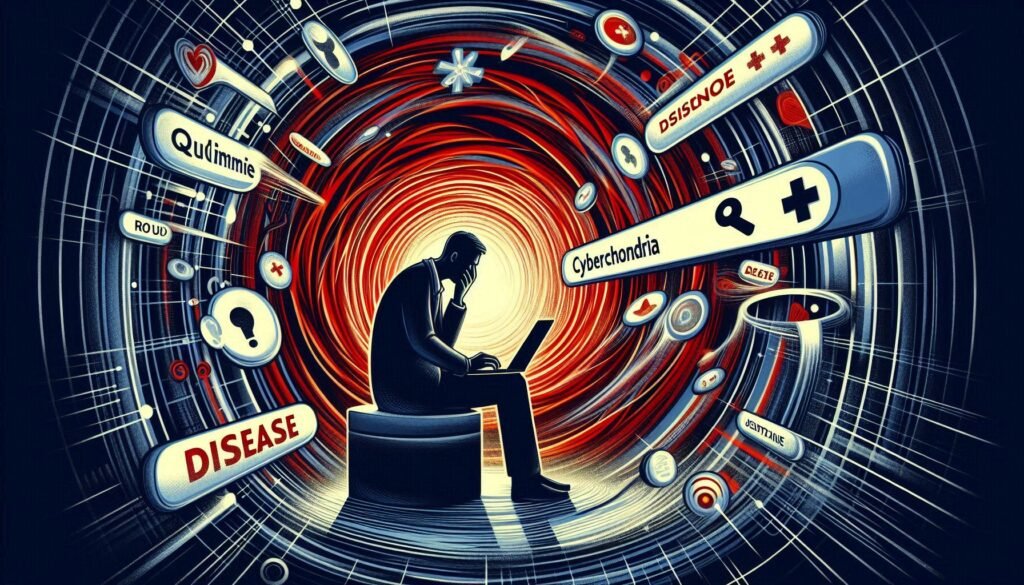In today’s digital age, health information is just a click away. While this accessibility can be empowering, it also comes with its own set of challenges—particularly for those predisposed to anxiety. Neuroticism and cyberchondria are emerging as significant concerns in the realm of online health searches. For many individuals, what starts as a simple inquiry about symptoms can quickly spiral into overwhelming worry and obsessive behavior.
The internet has transformed how we approach our health. Yet for neurotic personalities, this transformation often exacerbates existing anxieties rather than alleviating them. As they navigate the vast waters of medical knowledge available online, these individuals frequently find themselves trapped in a cycle of fear and uncertainty.
Understanding the relationship between neuroticism and cyberchondria not only sheds light on personal experiences but also equips us with tools to manage our mental well-being in an increasingly complex digital landscape. Whether you’re someone who tends to obsessively search symptoms or know someone who does, recognizing these patterns is crucial for maintaining both physical and emotional health.

Defining Cyberchondria: When Internet Searches Fuel Health Anxiety
Cyberchondria refers to the phenomenon where individuals experience heightened anxiety about their health due to excessive online searches. What begins as an innocent quest for information can quickly escalate into a barrage of worry and panic. It often leads users down a rabbit hole of worst-case scenarios that only fuel their fears.
The ease of accessing medical data on the internet has its drawbacks. Instead of providing clarity, this wealth of information can overwhelm neurotic individuals predisposed to anxiety. They may misinterpret benign symptoms or misunderstand medical terminology, leading to unnecessary distress.
This constant cycle of searching and worrying feeds into a negative feedback loop, perpetuating feelings of health-related fear. The more they search, the more anxious they become about potential diagnoses—often without consulting qualified professionals.
Cyberchondria exemplifies how the digital age complicates our relationship with health information. While knowledge is power, for some, it becomes a source of debilitating anxiety that affects quality of life.
The Neurotic Personality: A Predisposition to Online Health Concerns
Neuroticism is a personality trait characterized by emotional instability and heightened sensitivity to stress. Individuals with high levels of neuroticism often experience anxiety, mood swings, and irritability. This predisposition can significantly impact their mental health.
People who score high on the neuroticism scale are more likely to seek information about health online. Their tendency to worry amplifies when they encounter vague or alarming medical information. A simple search for symptoms can spiral into overwhelming fear.
These individuals may interpret benign sensations as signs of severe illness due to their anxious thought patterns. The internet provides vast resources, but it also creates an environment ripe for misinterpretation and unfounded concerns.
As a result, those with neurotic tendencies often find themselves trapped in cycles of excessive symptom checking and reassurance seeking online. Understanding this connection between neuroticism and cyberchondria is essential for addressing the growing issue of online health anxiety.
Digital Age Challenges: How the Internet Amplifies Neurotic Health Worries
The digital age has transformed how we access information, including health-related concerns. While this can be beneficial, it also presents challenges, particularly for individuals with neurotic tendencies. The internet is saturated with medical advice and personal anecdotes that often exaggerate symptoms or outcomes.
When a neurotic person encounters alarming stories online, their anxiety can escalate quickly. They may misinterpret normal bodily sensations as signs of serious illness. This heightened sensitivity to perceived threats fuels an endless cycle of worry and obsessive searching.
Moreover, the immediacy of information is a double-edged sword. Instant access to medical data allows for quick answers but often leads to misinformation spreading rapidly. Neurotic individuals are more likely to latch onto negative narratives rather than balanced perspectives on health issues.
Social media further complicates matters by creating echo chambers where fears are amplified among like-minded users. These platforms can perpetuate unrealistic expectations about health and wellness, leading those already prone to anxiety down a rabbit hole of self-doubt and concern.
Cognitive Patterns in Neurotic Individuals Prone to Cyberchondria
Neurotic individuals often exhibit specific cognitive patterns that heighten their susceptibility to cyberchondria. They tend to engage in catastrophic thinking, where minor symptoms are perceived as serious health issues. This tendency can lead them down a rabbit hole of online searches filled with alarming information.
Another common pattern is selective attention, which causes neurotic individuals to fixate on negative health-related content while ignoring reassuring data. This skewed perception fuels their anxiety and reinforces the belief that something is seriously wrong.
Additionally, they may experience heightened emotional reasoning, believing that if they feel anxious about a symptom, it must indicate a severe problem. These thought processes create an endless loop of worry and searching for answers online.
Confirmation bias plays a significant role; neurotic individuals seek out information that validates their fears rather than considering objective evidence. Together, these cognitive patterns contribute significantly to the cycle of health anxiety prevalent among those prone to cyberchondria.
The Cycle of Anxiety: From Neuroticism to Online Symptom Checking
Neuroticism often sets the stage for a cycle of health-related anxiety. Individuals with high levels of neurotic traits are more likely to interpret normal bodily sensations as signs of severe illness. This tendency creates an internal dialogue filled with worry and fear.
As these individuals experience discomfort or unusual symptoms, they turn to the internet for answers. The act of searching online can provide immediate relief but often leads them down a rabbit hole of information overload. Misinformation can exacerbate their fears rather than alleviate them.
Each search intensifies their anxiety, making them feel trapped in a loop where every new symptom warrants further investigation. This pattern reinforces their belief that something is seriously wrong, even when it may not be true.
The impact extends beyond just physical health; emotional well-being suffers too. Increased screen time dedicated to symptom checking leaves little room for productive coping mechanisms or positive self-care practices.
Impact of Social Media on Neurotic Health-Related Behaviors
Social media has revolutionized the way we access information, including health-related content. For neurotic individuals, this constant influx of data can intensify their existing worries. Platforms like Facebook and Twitter facilitate discussions about symptoms, diseases, and treatments that may trigger anxiety.
The viral nature of these platforms often leads to sensationalized health stories. Neurotic users might latch onto alarming posts or anecdotes shared by others, amplifying their fears. This cycle perpetuates a heightened state of alertness regarding personal health issues.
Moreover, social media fosters comparisons with peers’ experiences related to illness and wellness. Observing others who appear healthier or more informed can provoke feelings of inadequacy in neurotic individuals. These emotions further drive them toward seeking validation through excessive online research.
Engagement in online communities focused on chronic illnesses may provide support but also reinforce negative thought patterns for neurotics. The duality of connection and anxiety makes navigating social media especially challenging for those prone to cyberchondria.
Distinguishing Cyberchondria from Informed Patient Behavior
Cyberchondria and informed patient behavior may seem similar, but they stem from different motivations. Informed patients seek knowledge to make educated decisions about their health. They engage with reliable sources, aiming for a clearer understanding of symptoms and treatment options.
On the other hand, cyberchondriacs often spiral into a cycle of anxiety fueled by excessive online searches. Their quest for answers can lead to misinterpretation of medical information, exacerbating fears rather than alleviating them. This difference in approach highlights the underlying emotional state driving their research habits.
An informed patient typically approaches health queries with rationality. They consider multiple perspectives and consult healthcare professionals when needed. Conversely, individuals experiencing cyberchondria may become fixated on specific ailments or symptoms without seeking professional guidance.
Recognizing these distinctions is crucial for both patients and healthcare providers. Understanding whether someone is genuinely trying to be proactive or simply caught in an anxious loop can shape how support is offered during consultations.
Coping Strategies: Managing Neurotic Tendencies in the Digital Health Landscape
Managing neurotic tendencies, especially in the context of online health anxiety, requires intentional strategies. One effective method is practicing mindfulness. Mindfulness helps individuals become aware of their thoughts and feelings without judgment. This awareness can reduce the tendency to spiral into anxious thought patterns when searching for health information.
Another strategy involves setting boundaries on internet use related to health searches. Limiting time spent researching symptoms or conditions can help break the cycle of worry that often accompanies excessive online research. Designate specific times for checking trusted sources rather than allowing constant access throughout the day.
Creating a support system also plays a crucial role in coping with cyberchondria. Talking about fears with friends or family can provide emotional relief and offer perspective, helping to mitigate feelings of isolation that often accompany neuroticism.
Focusing on reliable sources is essential. Engaging with well-researched articles or consulting healthcare professionals fosters informed decision-making while reducing misinformation-driven anxiety.
The Role of Healthcare Providers in Addressing Neuroticism-Driven Cyberchondria
Healthcare providers play a crucial role in addressing neuroticism-driven cyberchondria. They are often the first line of defense for patients struggling with health anxiety exacerbated by online information. By fostering open communication, providers can create a safe environment where concerns can be discussed without judgment.
Education is key. Providers should inform patients about the limitations of online medical resources and encourage critical evaluation of the information found on the internet. This helps combat misinformation and promotes healthier search behaviors.
Additionally, healthcare professionals can offer reassurance and support tailored to individual needs. Understanding that some patients may have heightened sensitivity to health-related issues allows for more empathetic care strategies.
Continuous follow-up appointments can help track patient progress and reinforce positive coping mechanisms. By being proactive, healthcare providers not only alleviate immediate anxieties but also empower their patients to manage their health more effectively in a digital age filled with uncertainties.
Digital Literacy and Mental Health: Tools for Neurotic Individuals
Digital literacy plays a crucial role in managing neuroticism and cyberchondria. Understanding how to navigate online health information can empower individuals struggling with health anxiety.
One effective tool is learning how to critically evaluate sources. Not all medical advice found online is reliable or accurate. Recognizing reputable websites, such as those run by established healthcare organizations, can help filter out misinformation.
Another key aspect of digital literacy involves knowing when to seek professional guidance rather than relying solely on internet searches for symptoms. Telehealth services have become more accessible and offer the opportunity for immediate consultation with healthcare providers who can provide tailored advice based on personal circumstances.
Mindfulness apps and platforms that promote mental well-being are also beneficial resources. These tools encourage users to manage their anxiety effectively while navigating the overwhelming amount of information available online.
By enhancing digital skills related to healthcare consumption, neurotic individuals can reduce their anxiety levels significantly while obtaining credible knowledge about their health concerns. This proactive approach not only alleviates stress but fosters a healthier interaction with technology in an increasingly complex digital landscape.


